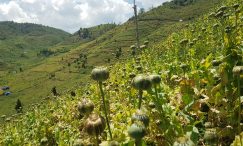This Journal of Contemporary Asia article discusses how the illegal drug trade has become integral to systems of brokered rule in northern Shan State, Myanmar.

“Ploughing the land five times”: Opium and agrarian change in the ceasefire landscapes of south-western Shan State, Myanmar
This Journal of Agrarian Change article explores the relationship between the illicit opium economy and processes of agrarian change in south-western Shan state, Myanmar.

Development zones in conflict-affected borderlands: The case of Muse, Northern Shan State, Myanmar
How are development zones ‘made’ in conflict-affected borderlands? What forms of territorialisation underpin the making of development zones in these contested spaces? What forms of public authority emerge to govern borderland development zones and whose interests do they serve? And how do long-standing histories of illicit border trade, fragmented sovereignty, and unresolved armed conflicts shape governance structures and everyday life in these development zones?

Understanding the drugs policy landscape in Myanmar
An examination of how drugs policies and programmes intersect with conflict, peace, health and development in Myanmar.

Five considerations for international actors trying to engage with drugs policy in Myanmar
Based on analysis of how drugs policies and programmes intersect with conflict, peace, health and development in Myanmar.

Precarity, poverty and poppy: Encountering development in the uplands of Shan State, Myanmar
The paper argues that if the current agenda to developmentalise drug policy is to make a meaningful contribution to the lives of the rural poor in drug-producing regions in Myanmar and beyond, it must confront the fact that for many households the decision to cultivate opium has been a response to the very processes of market-led rural development that policymakers claim will alleviate poverty.
